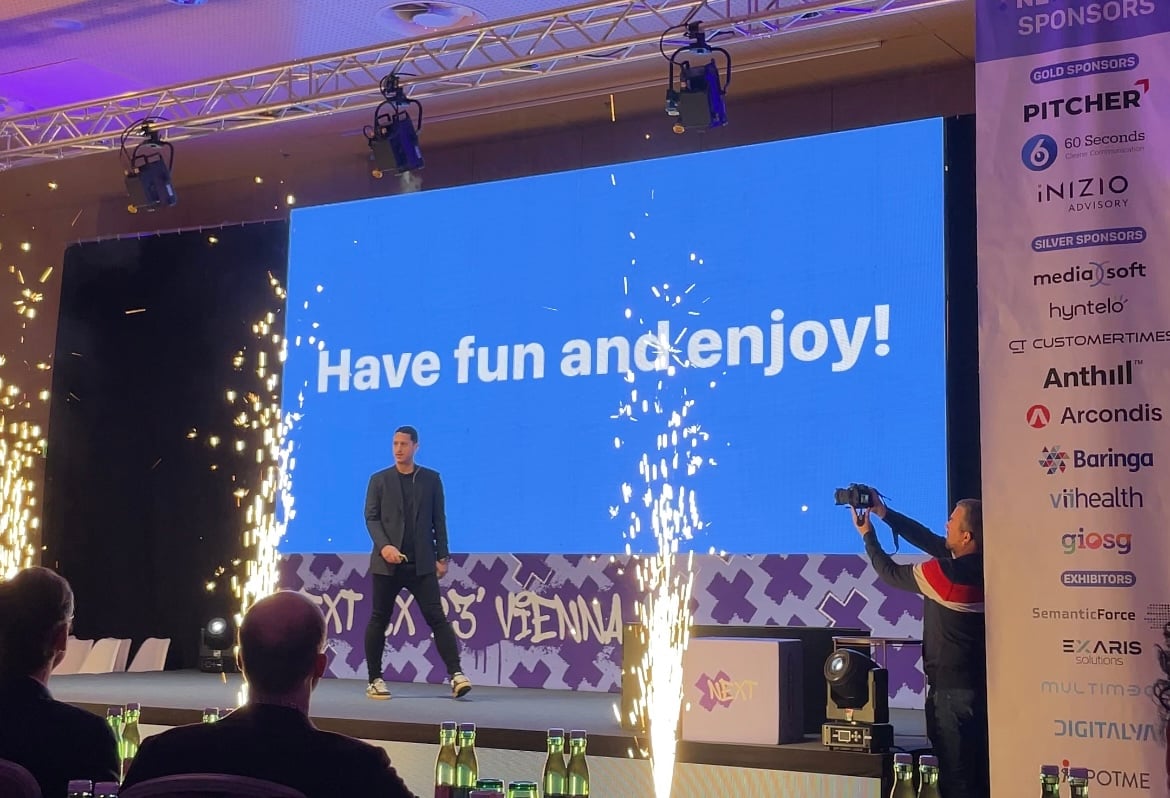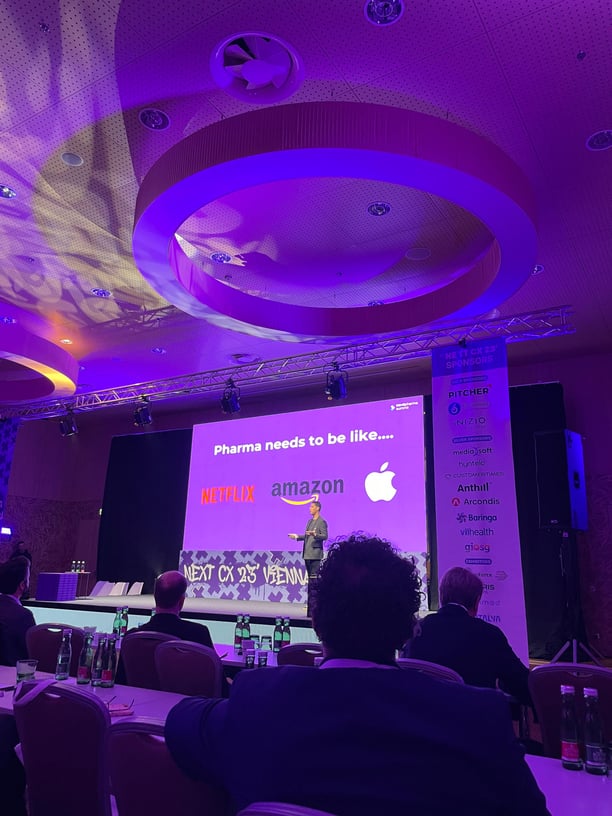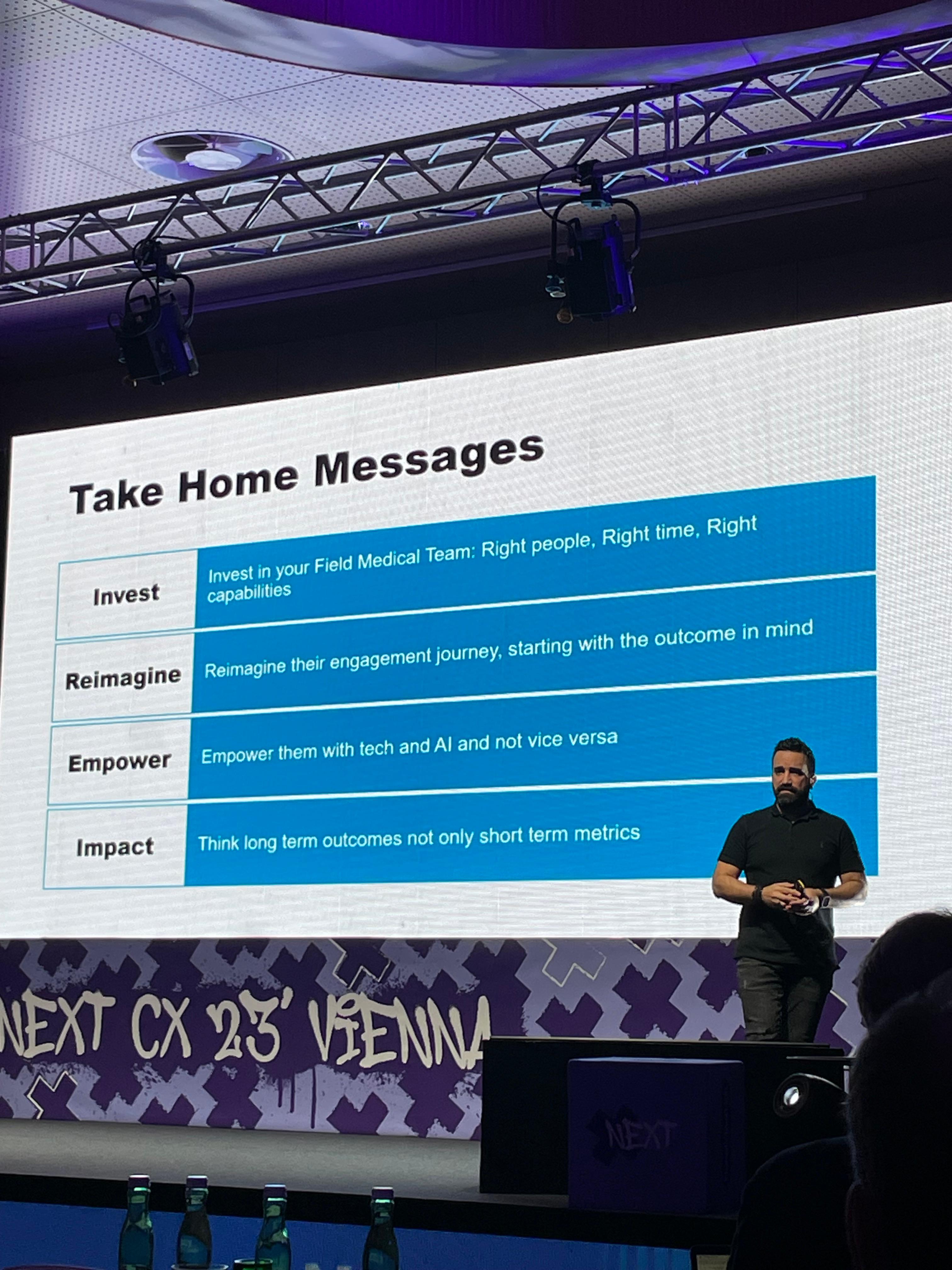
Vienna, November 21th & 22nd, 2023. In this article, we summarize the event days full of discussions and pressing topics of how to understand customers (HCP's) and improve CX in the pharma industry. The event contained sessions by multiple industry peers. Read more to learn about the insights, discussions and take-away's that were shared during the event.
What Pharma Needs in Terms of CX
The founder of the event Next Pharma Summit, Dario Safaric, started his speech on stage to kick off the first sessions of the day. The event agenda would contain a lot of interesting insights around the buzzwords and ways of working, like:
- Omni-channel
- Modular content
- Gen AI
- CX
- Tech
- Think humans to humans.
Within those topics, the discussions come to be around;
- Knowing who the customer is
- Understanding that our customers expect great CX like provided from companies Amazon, Google, etc
- What value can we bring into the customer journeys and touch points?
- Can we bring in a sense of belonging?
- Aligned human and culture empowered by tech/digital
- The perfect orchestration of an employee in the perfect moment and perfect value?
He continued to state that the fundamental questions that pharma leaders needs to ask themselves and their teams in order to change CX, is always the WHO, WHAT, and HOW.
"70% of digital transformation initiatives focused on CX fails."

Opening Panel: Unlocking The Power of CX for authentic and Meaningful Engagements
The first panel speakers on stage were Alexandre Prigent, Head of Corporate Competitive Intelligence at Servier, Dana Vigier, VP, Central & Northern Europe Area Head at ALEXION, and Panos Papakonstantinou, Global Digital Engagement Catalyst Leader at Roche.
In this session, they underlined that everything starts and ends with the customer. The important thing to remember is always to think about; who is the customer?
The why is very obvious. The pharma businesses wants to deliver the drugs, do research and them market them. And the comparison with for example companies like google and Amazon that the pharma industry can learn from, is how they make the information so accessible – giving the customers the information that they need.
People wants instant answers, and that's where the pharma industry needs to work in a smarter and better way.
"Time and value matters"
The discussion continued about that technology has a lot to offer. It can help with adding the right type of information on the website at the right time.
"We need to think in the terms humans to humans, not B2B or B2C. It's all about that we want to find the best way to provide our content with one point of contact – and give support to the customers", said Alexandre Prigent.
The Secret of Ingredient(s) to a Differentiated Customer Experience
In this panel, it was Adela Schulz, iEU Strategy & Operations Omnichannel Lead at ucb, Marina Luca, Global Digitl Excellence Director at Servier, and Nataliya Andreychuk, CEO at Viseven.
Some recommendations were provided from the panel, of how to implement better strategies in order to achieve a better customer experience;
- Work with AI & Chat GPT
- Working with tech; as well as the people
- We need to improve mindsets; it's definitely what remains the biggest challenge in pharma
- Having the leaders buy in by the middle management
- Being more agile and the content needs to be more accessible.
Compassion is not just important, it's essential for patients, doctors, nurses, and everyone in healthcare
Hicham Naim, Vice President, Head of Strategy & Transformation at Takeda, shared some interesting statistics on stage;
📊 85% of patients reported that a doctor's compassion was more important than waiting time or cost.
📊 Nearly three quarters of respondents said they had gone to doctors who were not compassionate
A striking 85% of patients have expressed that a doctor's compassion matters more to them than the waiting time or cost of treatment. Interestingly, nearly three-quarters of these patients have encountered doctors who seemed to lack compassion.
But, it's crucial to understand that doctors inherently possess empathy and compassion. They often adopt 'compassionate detachment' as a strategy to cope with the stress of their profession. This approach allows them to maintain their professionalism while navigating through emotional complexities.
Unfortunately, this detachment is sometimes misconstrued as a lack of empathy. The real challenge lies in finding a delicate balance between professional objectivity and genuine, heartfelt care. We must address the pressing issues facing doctors and healthcare professionals, such as preventing burnout, which affects 56%, managing the intense workload, including an average of 25 hours per week dealing with EHRs and paperwork, and mitigating cognitive fatigue.
Empowering human expertise with AI wizardry for unparalleled impact
Next up on stage was Carlos Eid, Executive Medical Director at Novartis. Carlos shared insights around using AI in pharma, and connect better with customers and that leaders must sometimes make the right (hard) choices:
- Viewing Engagement through a new Lens
- Incorporating Tech & AI
- Developing, Upskilling and Retaining Talent
- Tracking Progress and Measuring Impact.

So, how can leaders think of AI and tech support this Rennaissance?
- Stay up-to-date on the latest scientific research
- Personalize their Interactions with Healthcare Professionals
- Be more efficient and productive
- Improve their communication and collaboration skills
- Measure and track their performance/impact.
Take home messages:
Invest – Invest in your field Team; Right people Right time, Right capabilities
Reimagine – Reimagine their engagement journey, starting with the outcome in mind
Empower – Empower them with tech and AI and not vice versa)
Impact – Think long term outcomes not only short term metrics).
"AI is improving diagnotics, enabling personalized medicine, accelerating drug discovery, and enhancing telemedecine in healthcare"
Forbes
Brian Shroyer, Sr. Omnichannel Campaign Manager at Novo Nordisk, went through his thoughts on how to measure customer experience. His recommendation was to measure it through
- Campaign & web analytics
- Content performance
- Frontline feedback
- HCP focus group interviews
- NPS score
"40-70% of an HCPs pharma brand perception is due to CX"
Summary & key takeaways
Our takeaways summarized from this event when it comes to customer engagement and how to improve that, has been;
- Invest in tech
To be able to provide the right content at the right time to HCPs is crucial. Learn more here. - Top leaders needs to listen more to the innovative middle-management in order for changes to be made in the pharma industry
- Improve CX by always think like the customer; how, what, why.
- Work with surveys and invest in research in order to really understand your customers needs
- The medical teams and commercial teams must work closer together in order to achieve better results to market and the end-customer
- Culture & stakeholders should be more aligned.
We want to thank the speakers for great insights, and the event organizers Next Pharma Summit for great days in Vienna!